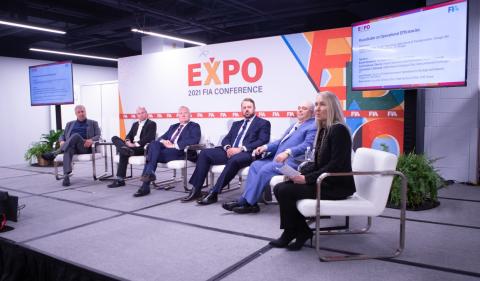Customers, clearing firms and clearinghouses in derivatives markets agree that it is time for the industry to come together and find common ground in order to tackle core operational challenges of the present and to ensure markets remain vibrant and innovative in the future.
At the 2021 FIA Futures & Options Expo in Chicago on 3 November, a panel discussion on operational efficiencies revisited the challenges created by record derivatives volumes in March 2020 -- particularly in the area of reconciling trades promptly on top-day. Participants noted that this and other areas of the clearing process are worth considering to improve front-to-back efficiency.
Louis Rosato, director of global investment operations for strategy and industry engagement at BlackRock, noted that exchange-traded derivatives markets are currently quite vibrant and resilient, and investors effectively used derivatives products to manage their risks amid the uncertainty of the last two years.
But he expressed frustration that "operations have a certain level of friction" at present and said it is worth considering ways to reduce that friction to benefit every firm that participates in derivatives markets.
"It's really going to take all of us coming together to do this. It's not just one subset of the marketplace from a buy-side or sell-side or third-party intermediary that can just maintain or invest in this," Rosato said.
Rosato expressed support for the idea of forming a standards body to spearhead an industry-wide effort. "A standards body really makes sense as a way to get awareness up and help people get involved to start doing some of the work," he said.
Such a standards body was proposed one day earlier at Expo in an FIA report entitled, “Modernizing the Listed Derivatives Workflow: A Blueprint for Change." Conducted by JDX consulting, the FIA report calls for the formation of an independent standards body that broadly represents industry stakeholders and develops a consensus-driven agenda.
Every firm deals with a unique set of frictions, said Christopher Edmonds, global head of clearing and risk at Intercontinental Exchange. That means the first step towards improving operational efficiencies should be to educate various market participants of the realities of an end-to-end trade in modern derivatives markets.
"If you look at all the businesses we represent, we would probably give you a variety of answers to the question of where we found the pain points in March and April of 2020," Edmonds said. "We've made investments into technology and the operational workflow that work well for us, but they may not work well for others. The thing I'm most excited about is doing that deep dive, fully beginning to end, and identifying where the challenges are. Because I may not see a pain point I'm causing for another market participant."
The idea of industry-wide standards is not foreign to derivatives markets, said Scott Andersen, head of Americas listed derivatives at Societe Generale and president of FIA's Operations Americas Division.
"Our industry, for a very long time, has had best practices and common behaviors that have existed and that everyone abides by for the most part," Andersen said. "On the back of the volume and volatility that we had in March 2020, I think it's about how do we reinforce the message and make sure we're all operating within the same kind of framework that benefits everybody, from clients to exchanges to the sell-side."
Russell Abramson, managing director and global head of client solutions and technology strategy, futures and options and OTC clearing at Bank of America, acknowledged that "some people hear standards and it comes across as a bit rigid." However, he noted the industry has benefited from having standards such as the FIX messaging protocol.
"FIX is really just about us communicating with each other, something that's very basic and very narrow in focus," Abramson said. "But without it we would be very challenged when it comes to electronic trading or electronic automation of allocations or moving into other assets and spread trading."
Brian Sayers, executive director of post-trade services and risk at CME Group, noted that standardization efforts cannot stifle the culture of innovation in derivatives markets. He also noted there will naturally be varying opinions among market participants on the key challenges to tackle first -- or in some cases, whether there's even a challenge worth addressing at all. But fundamentally, the industry should be encouraged by the fact that discussions on operational improvements are taking place, proving there is a will to explore these issues and improve derivative markets rather than simply settle for the status quo.
"We haven't talked about operations in this wide of a forum in a long time and it's great that the time has come," Sayers said. "There are little things we can do on the back end to improve this process for everybody involved. We will learn a lot about ourselves as an industry as part of this process."


